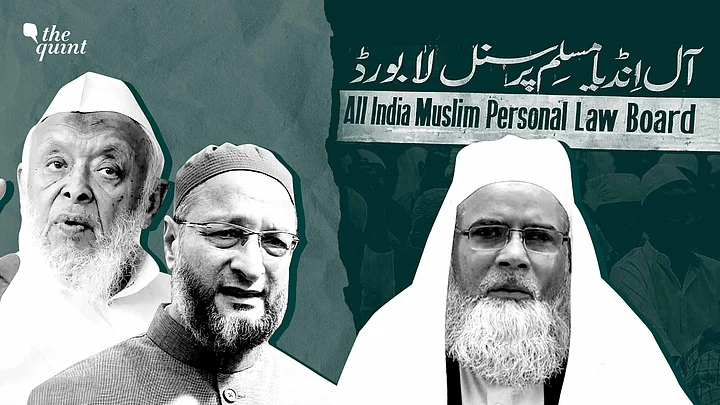As the politics around the Uniform Civil Code (UCC) escalates, various Muslim organisations have slammed the proposal, seeing it as a violation of minority rights. However, each body is employing a different set of arguments to counter the UCC.
On Tuesday, 4 July, PM Narendra Modi at a rally in Bhopal raked up UCC in his speech, giving it fresh fodder. “How can there be different laws for different people in our country?,” he questioned.
The Law Commission had, last month, in a press release, invited opinions of political parties as well as religious and social groups about the implementation of the UCC, kicking up a storm.
While the All India Muslim Personal Law Board (AIMPLB) has argued that the UCC will be a violation of multiple Articles of the Indian Constitution, the Jamiat Ulama-i-Hind (JUH) has stated that a UCC will hurt the unity of Hindu-Muslim relations in the country, and Muslim bodies in Kerala have questioned the political biases behind the move.
The Jamaat-e-Islami Hind (JIH), which has in the past been vocal against the UCC, has so far seemed unwilling to stick its neck out this time around with a clear position on the issue.
AIMPLB's Response To Law Commission
The AIMPLB on Wednesday, 5 July, filed its response to the law commission. At the onset, the AIMPLB termed the Law Commission’s notice “vague, too general, and unclear.”
“The terms for the suggestions to be invited are missing. It appears that such a large issue has been floated in the public domain to seek a referendum as to whether the reaction of the general public also reaches the Commission in either equally vague terms or in a 'yes' or 'no',” the AIMPLB’s response states.
“...the fundamental religious book of Muslims, being the Holy Quran, Sunnah and Fiqh (Islamic Law) in the form of religious texts, which are matters of Articles 25 & 26, mandate its believers to follow the injunctions as prescribed therein. The followers of Islam find themselves bound by those injunctions and the same are non-negotiable terms.”
-AIMPLB’S Response To Law Commission On UCC
Besides Article 25 (right to free profession, practice and propagation of religion) and Article 26 (right to manage one’s own affairs in matters of religion), the AIMPLB has also said that the Article 29 (protection of interests of minorities) also stands against any possibility of a UCC. Further, the AIMPLB’s statement analyses how “religious principles and customary and tribal exemptions...have been reflected in the existing statutes”.
“The most crucial document of our nation, the Constitution of India, is itself not uniform in nature, prudently and with the intention to keep the country united. Different treatment, accommodation, adjustment is the nature of our Constitution. Different territories of the nation have been given different treatments. Different communities have been made entitled to different rights. Different religions have been given different accommodations.”
- AIMPLB’S Response To Law Commission On UCC
'UCC Wrong...But Don't Take To Streets': JUH
Meanwhile the JUH president Arshad Madani has stated that the UCC “goes against the Muslim Personal Law.”
“This is being done to create differences between Hindus and Muslims. They want to do so to spread a message that we were able to do that to Muslims which no government had been able to do since Independence,” Madani said.
However, he added that “Muslims should not go on to the streets to protest this.”
Moreover, Madani also took to the previous law commission’s report, which categorically rejected the UCC calling it “neither necessary nor desirable at this stage.”
In contrast, the JIH has stayed relatively mum on the issue. Back in 2018, the JIH had welcomed the law commission’s report. “We welcome the Law Commission’s assertion that a Uniform Civil Code is neither necessary nor desirable. However, we do not favor any changes and reforms in the personal law as suggested by the panel,” Muhammad Salim Engineer, the JIH Secretary-General had said in 2018.
Sources said that the body wants to be “wait it out before jumping the gun on the issue, since no blueprint or draft has been proposed yet.” Moreover, given that many tribal groups have also expressed disapproval of any form of UCC, the Muslim bodies hope that may also serve to possibly derail the proposal.
"What About 'Hindu Undivided Family' Act?"
Meanwhile, political parties have also made their opposition to the UCC clear—employing a more political line of attack.
Attacking PM Modi on whether UCC will challenge special acts among Hindus, AIMIM’s Asaduddin Owaisi wrote “Will the PM end "Hindu Undivided Family"? Because of HUF, the country loses ₹3064 crores every year.”
In Kerala, the Indian Union Muslim League (IUML) led a meeting of various non-political Muslim groups on Tuesday, which then opined on the UCC. The Muslim bodies part of the meet included the Samastha Kerala Jamiyyathul Ulama, the Kerala Nadvathul Mujahideen, the Muslim Education Society, and the Muslim Service Society.
"UCC is not an issue of Muslims, it is of all people. We will unite all people against it and fight legally and politically," IUML state president Panakkad Sayyid Sadiq Ali Shihab Thangal, was reported as saying.
